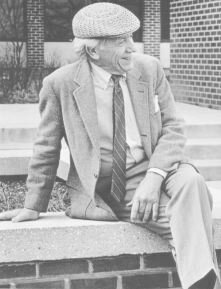>> Back to The HooK front page
COVER STORY SIDEBAR- Professor Taylor: The writer was also a warm and generous instructor
Issue #20 of The Hook; published 06/20/02
BY JAY CLAYTON

Peter Taylor was my teacher-- not the best I ever had, but the one I grew to love best.
Peter's classes at the University of Virginia were low-key. He might read aloud a story he admired, taking up much of the two-hour seminar, then ask for reactions with a shy smile.
It was Peter's monthly parties at his home in Charlottesville that made all the difference. There, one might meet writers of Peter's generation, close friends of his like Robert Lowell, Jean Stafford, Nancy Milford, James Merrill, and Mary Lee Settle, as well as younger writers such as John Casey, Ann Beattie, James Alan McPherson, and George Bradley. After dinner, Eleanor Ross Taylor, a wonderful poet and severe devotee of the craft of art, would invite all the women upstairs to view her collection of antique dolls.
Nervous hilarity always greeted these invitations-- was she serious, or was this some kind of tongue-in-cheek game with the manners of a bygone age? The answer lay in the mix of friendship, wit, high intelligence, and shared memories that filled the air. The evenings were a tribute to the art of conversation, not to quaint social rituals or old-fashioned values.
Outsiders may have thought the atmosphere was uniquely Southern, but it did not feel that way to me, a young man raised in the South. The performance was more Virginia Woolf than Margaret Mitchell, more Edith Wharton or Henry James than anything resembling Peter's predecessor at Virginia, William Faulkner.
The parties were an education all by themselves. Just as valuable, though, were the private conversations about writing. One summer afternoon I finished a story, and too excited to wait until I saw him next, I called Peter on the phone. Classes were not in session-- we had not met in weeks.
"Come on over," he said. "I've got something to show you too."
When I arrived at his house on Wayside Place he showed me into his downstairs study. "Read this while I read yours," Peter said, and passed me the typescript of "The Hand of Emmagene."
I do not have any memory of what Peter said about my story, but it must have been excellent advice, because it helped me turn the piece into my first published work. I do remember every word of what he said about his own story. His father had died the year before, and Peter talked of how this loss was beginning to free him up to write about things he had never before dared to confront.
"The Hand of Emmagene" is a harrowing tale about a young woman who cuts off her own hand. It is written in a curious, informal free verse but is clearly a work of fiction, not poetry. Peter told me how Gordon Lish, the flamboyant fiction editor of Esquire at the time, had asked to see the story. Lish's letter of response began, "YES, YES, YES, YES!" then went on for two cramped pages of criticism before ending with "NO, NO, NO, NO!"
Even the Chekhov of the South had to face rejection.
This experience prompted him to talk about the trials he had faced as a young writer. He told me of having submitted story after story to The New Yorker and having had them all rejected until Robert Penn Warren published Peter's first story, "The Fancy Woman," in The Southern Review. Lo and behold, he received a letter from the editors of The New Yorker asking to see some of his work. He immediately sent them back two of the stories they had previously rejected, and the magazine took them both.
He told me of his father's resistance to his desire to become a writer. Even though he had already published brilliant stories in The Southern Review and The New Yorker that would go into his first book, The Long Fourth, his father still would not take his calling seriously. It was not until Peter secured an appointment as a lecturer at Southwestern at Memphis, now Rhodes College, that his father embraced the young man's choice.
When Peter came to Memphis to take up his new post, his father held a garden party in his honor. Carefully positioning himself at the far end of the garden, his father called out to him with pride, for everyone to hear, "Professor! Professor! I have someone I want you to meet, Professor."
Jay Clayton got his PhD at UVA in 1979 and is now a professor of English at Vanderbilt University. This story originally appeared in the Nashville Scene.
#
>> Back to The HooK front page
|